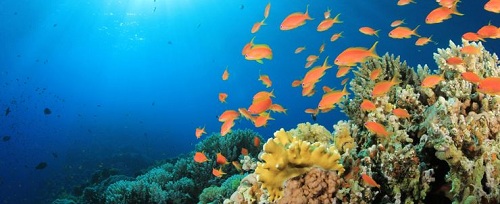Most coral reefs are at risk unless climate change is drastically limited
Posted on 14 October 2012 by John Hartz
This is a reprint of a news release posted by the Potsdam Instititue for Climatic Impact Research on Sep 16, 2012.
This post discusses the results of a recently published peer-reviewed paper, Frieler (2012), highlighting the severe worldwide threat posed to coral reefs from ocean warming and ocean acidification. The dramatic decline of living coral cover on Australia's Great Barrier Reef, detailed in another recently published paper, De'ath (2012), will be the subject of an upcoming post.
![]()

Coral reef in the Red Sea. Photo: thinkstock
Coral reefs face severe challenges even if global warming is restricted to the 2 degrees Celsius commonly perceived as safe for many natural and man-made systems. Warmer sea surface temperatures are likely to trigger more frequent and more intense mass coral bleaching events. Only under a scenario with strong action on mitigating greenhouse-gas emissions and the assumption that corals can adapt at extremely rapid rates, could two thirds of them be safe, shows a study now published in Nature Climate Change. Otherwise all coral reefs are expected to be subject to severe degradation.
Coral reefs house almost a quarter of the species in the oceans and provide critical services – including coastal protection, tourism and fishing – to millions of people worldwide. Global warming and ocean acidification, both driven by human-caused CO2 emissions, pose a major threat to these ecosystems
“Our findings show that under current assumptions regarding thermal sensitivity, coral reefs might no longer be prominent coastal ecosystems if global mean temperatures actually exceed 2 degrees Celsius above the pre-industrial level,” says lead author Katja Frieler from the Potsdam Institute for Climate Impact Research. “Without a yet uncertain process of adaptation or acclimation, however, already about 70% of corals are projected to suffer from long-term degradation by 2030 even under an ambitious mitigation scenario.” Thus, the threshold to protect at least half of the coral reefs worldwide is estimated to be below 1.5 degrees Celsius mean temperature increase.
A more comprehensive and robust representation than in previous studies
This study is the first comprehensive global survey of coral bleaching to express results in terms of global mean temperature change. It has been conducted by scientists from Potsdam, the University of British Columbia in Canada and the Universities of Melbourne and Queensland in Australia. To project the cumulative heat stress at 2160 reef locations worldwide, they used an extensive set of 19 global climate models. By applying different emission scenarios covering the 21st century and multiple climate model simulations, a total of more than 32,000 simulation years was diagnosed. This allows for a more robust representation of uncertainty than any previous study.
Corals derive most of their energy, as well as most of their famous color, from a close symbiotic relationship with a special type of microalgae. The vital symbiosis between coral and algae can break down when stressed by warm water temperatures, making the coral “bleach” or turn pale. Though corals can survive this, if the heat stress persists long enough the corals can die in great numbers. “This happened in 1998, when an estimated 16% of corals were lost in a single, prolonged period of warmth worldwide,” says Frieler.
Adaptation is uncertain and ocean acidification means even more stress
To account for a possible acclimation or adaptation of corals to thermal stress, like shifts to symbiont algae with a higher thermal tolerance, rather optimistic assumptions have been included in the study. “However, corals themselves have all the wrong characteristics to be able to rapidly evolve new thermal tolerances,” says co-author Ove Hoegh-Guldberg, a marine biologist at the University of Queensland in Australia. “They have long lifecycles of 5-100 years and they show low levels of diversity due to the fact that corals can reproduce by cloning themselves. They are not like fruit flies which can evolve much faster.”
Previous analyses estimated the effect of thermal adaptation on bleaching thresholds, but not the possible opposing effect of ocean acidification. Seawater gets more acidic when taking up CO2 from the atmosphere. This is likely to act to the detriment of the calcification processes crucial for the corals’ growth and might also reduce their thermal resilience. The new study investigates the potential implications of this ocean acidification effect, finding that, as Hoegh-Guldberg says: “The current assumptions on thermal sensitivity might underestimate, not overestimate, the future impact of climate change on corals.”
This comprehensive analysis highlights how close we are to a world without coral reefs as we know them. “The window of opportunity to preserve the majority of coral reefs, part of the world’s natural heritage, is small,” summarizes Malte Meinshausen, co-author at the Potsdam Institute for Climate Impact Research and the University of Melbourne. “We close this window, if we follow another decade of ballooning global greenhouse-gas emissions.”
Subject Paper:
Frieler, K., Meinshausen, M., Golly, A., Mengel, M., Lebek, K., Donner, S., Hoegh-Guldberg, O. (2012): Limiting global warming to 2°C is unlikely to save most coral reefs. Nature Climate Change [DOI: 10.1038/NCLIMATE1674] (Advance Online Publication)































 Arguments
Arguments























 0
0  0
0






Comments